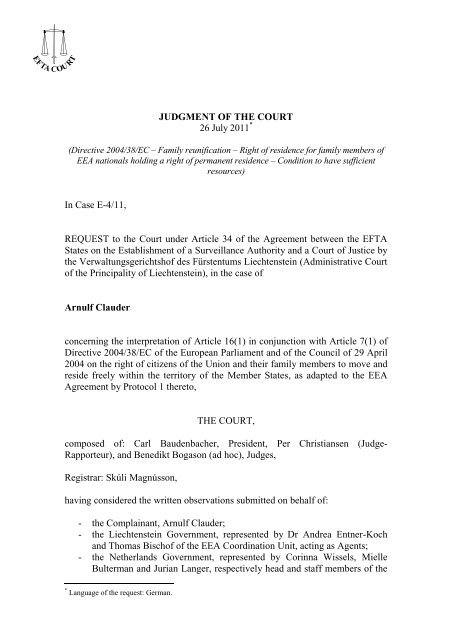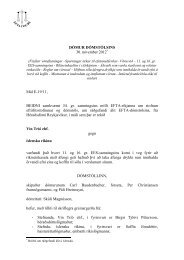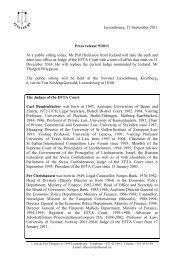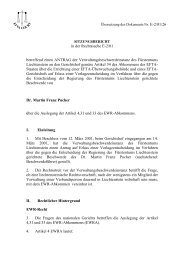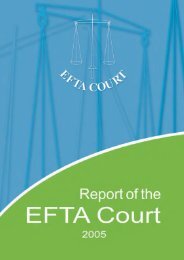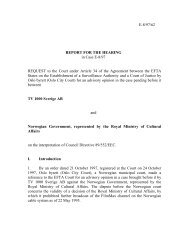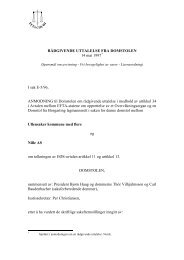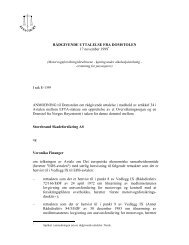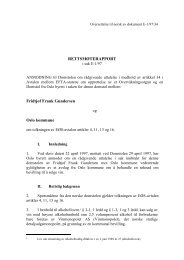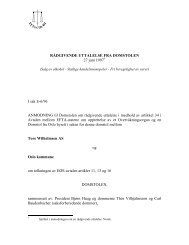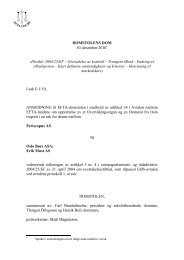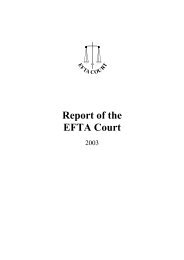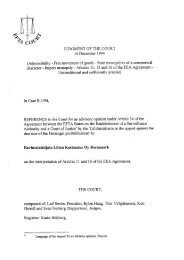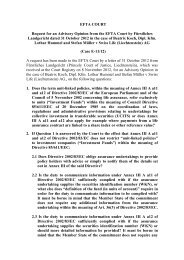Judgment of the Court in English - EFTA Court
Judgment of the Court in English - EFTA Court
Judgment of the Court in English - EFTA Court
You also want an ePaper? Increase the reach of your titles
YUMPU automatically turns print PDFs into web optimized ePapers that Google loves.
JUDGMENT OF THE COURT<br />
26 July 2011 *<br />
(Directive 2004/38/EC – Family reunification – Right <strong>of</strong> residence for family members <strong>of</strong><br />
EEA nationals hold<strong>in</strong>g a right <strong>of</strong> permanent residence – Condition to have sufficient<br />
resources)<br />
In Case E-4/11,<br />
REQUEST to <strong>the</strong> <strong>Court</strong> under Article 34 <strong>of</strong> <strong>the</strong> Agreement between <strong>the</strong> <strong>EFTA</strong><br />
States on <strong>the</strong> Establishment <strong>of</strong> a Surveillance Authority and a <strong>Court</strong> <strong>of</strong> Justice by<br />
<strong>the</strong> Verwaltungsgerichtsh<strong>of</strong> des Fürstentums Liechtenste<strong>in</strong> (Adm<strong>in</strong>istrative <strong>Court</strong><br />
<strong>of</strong> <strong>the</strong> Pr<strong>in</strong>cipality <strong>of</strong> Liechtenste<strong>in</strong>), <strong>in</strong> <strong>the</strong> case <strong>of</strong><br />
Arnulf Clauder<br />
concern<strong>in</strong>g <strong>the</strong> <strong>in</strong>terpretation <strong>of</strong> Article 16(1) <strong>in</strong> conjunction with Article 7(1) <strong>of</strong><br />
Directive 2004/38/EC <strong>of</strong> <strong>the</strong> European Parliament and <strong>of</strong> <strong>the</strong> Council <strong>of</strong> 29 April<br />
2004 on <strong>the</strong> right <strong>of</strong> citizens <strong>of</strong> <strong>the</strong> Union and <strong>the</strong>ir family members to move and<br />
reside freely with<strong>in</strong> <strong>the</strong> territory <strong>of</strong> <strong>the</strong> Member States, as adapted to <strong>the</strong> EEA<br />
Agreement by Protocol 1 <strong>the</strong>reto,<br />
THE COURT,<br />
composed <strong>of</strong>: Carl Baudenbacher, President, Per Christiansen (Judge-<br />
Rapporteur), and Benedikt Bogason (ad hoc), Judges,<br />
Registrar: Skúli Magnússon,<br />
hav<strong>in</strong>g considered <strong>the</strong> written observations submitted on behalf <strong>of</strong>:<br />
- <strong>the</strong> Compla<strong>in</strong>ant, Arnulf Clauder;<br />
- <strong>the</strong> Liechtenste<strong>in</strong> Government, represented by Dr Andrea Entner-Koch<br />
and Thomas Bisch<strong>of</strong> <strong>of</strong> <strong>the</strong> EEA Coord<strong>in</strong>ation Unit, act<strong>in</strong>g as Agents;<br />
- <strong>the</strong> Ne<strong>the</strong>rlands Government, represented by Cor<strong>in</strong>na Wissels, Mielle<br />
Bulterman and Jurian Langer, respectively head and staff members <strong>of</strong> <strong>the</strong><br />
* Language <strong>of</strong> <strong>the</strong> request: German.
– 2 –<br />
European Law Division <strong>of</strong> <strong>the</strong> Legal Affairs Department <strong>of</strong> <strong>the</strong> M<strong>in</strong>istry<br />
<strong>of</strong> Foreign Affairs, act<strong>in</strong>g as Agents;<br />
- <strong>the</strong> <strong>EFTA</strong> Surveillance Authority (“ESA”), represented by Xavier Lewis,<br />
Director, and Florence Simonetti, Senior Officer, Department <strong>of</strong> Legal &<br />
Executive Affairs, act<strong>in</strong>g as Agents;<br />
- <strong>the</strong> European Commission (“<strong>the</strong> Commission”), represented by Christ<strong>in</strong>a<br />
Tufvesson and Michael Wildersp<strong>in</strong>, Legal Advisers, act<strong>in</strong>g as Agents,<br />
hav<strong>in</strong>g regard to <strong>the</strong> Report for <strong>the</strong> Hear<strong>in</strong>g,<br />
hav<strong>in</strong>g heard oral argument <strong>of</strong> <strong>the</strong> Liechtenste<strong>in</strong> Government, represented by its<br />
agent, Dr Andrea Entner-Koch; <strong>the</strong> Government <strong>of</strong> Denmark, represented by its<br />
agent, Christian Vang; ESA, represented by its agent, Florence Simonetti; and<br />
<strong>the</strong> Commission, represented by its agent, Christ<strong>in</strong>a Tufvesson, at <strong>the</strong> hear<strong>in</strong>g on<br />
28 June 2011,<br />
gives <strong>the</strong> follow<strong>in</strong>g<br />
I Introduction<br />
<strong>Judgment</strong><br />
1 By a letter <strong>of</strong> 14 February 2011, registered at <strong>the</strong> <strong>EFTA</strong> <strong>Court</strong> on 16 February<br />
2011, <strong>the</strong> Adm<strong>in</strong>istrative <strong>Court</strong> <strong>of</strong> <strong>the</strong> Pr<strong>in</strong>cipality <strong>of</strong> Liechtenste<strong>in</strong> (“<strong>the</strong><br />
Adm<strong>in</strong>istrative <strong>Court</strong>”) made a request for an Advisory Op<strong>in</strong>ion <strong>in</strong> a case<br />
pend<strong>in</strong>g before it concern<strong>in</strong>g Arnulf Clauder (“Mr Clauder” or “<strong>the</strong><br />
Compla<strong>in</strong>ant”).<br />
2 The case before <strong>the</strong> Adm<strong>in</strong>istrative <strong>Court</strong> concerns <strong>the</strong> decision by <strong>the</strong><br />
Liechtenste<strong>in</strong> Government not to grant <strong>the</strong> Compla<strong>in</strong>ant, who is economically<br />
<strong>in</strong>active and <strong>in</strong> receipt <strong>of</strong> social welfare benefits, a family reunification permit for<br />
his spouse.<br />
3 Reference is made to <strong>the</strong> Report for <strong>the</strong> Hear<strong>in</strong>g for a fuller account <strong>of</strong> <strong>the</strong> legal<br />
framework, <strong>the</strong> facts, <strong>the</strong> procedure and <strong>the</strong> written observations submitted to <strong>the</strong><br />
<strong>Court</strong>, which are mentioned or discussed here<strong>in</strong>after only <strong>in</strong>s<strong>of</strong>ar as is necessary<br />
for <strong>the</strong> reason<strong>in</strong>g <strong>of</strong> <strong>the</strong> <strong>Court</strong>.<br />
II Legal background<br />
European Convention on Human Rights<br />
4 Article 8 <strong>of</strong> <strong>the</strong> European Convention on Human Rights (“ECHR”) – Right to<br />
respect for private and family life – reads as follows:<br />
1. Everyone has <strong>the</strong> right to respect for his private and family life, his<br />
home and his correspondence.
…<br />
EEA law<br />
– 3 –<br />
5 Directive 2004/38/EC <strong>of</strong> <strong>the</strong> European Parliament and <strong>of</strong> <strong>the</strong> Council <strong>of</strong> 29 April<br />
2004 on <strong>the</strong> right <strong>of</strong> citizens <strong>of</strong> <strong>the</strong> Union and <strong>the</strong>ir family members to move and<br />
reside freely with<strong>in</strong> <strong>the</strong> territory <strong>of</strong> <strong>the</strong> Member States (OJ 2004 L 258, p. 77), as<br />
adapted to <strong>the</strong> EEA Agreement by EEA Jo<strong>in</strong>t Committee Decision No 158/2007<br />
<strong>of</strong> 7 December 2007 (“Directive 2004/38” or “<strong>the</strong> Directive”), is referred to at<br />
po<strong>in</strong>t 1 <strong>of</strong> Annex V and po<strong>in</strong>t 3 <strong>of</strong> Annex VIII to <strong>the</strong> EEA Agreement. In<br />
particular, po<strong>in</strong>t 3(c) <strong>of</strong> Annex VIII provides that for <strong>the</strong> purposes <strong>of</strong> <strong>the</strong> EEA<br />
Agreement, <strong>the</strong> words „Union citizen(s)‟ shall be replaced by <strong>the</strong> words<br />
„national(s) <strong>of</strong> EC Member States and <strong>EFTA</strong> States‟.<br />
6 Article 2 <strong>of</strong> <strong>the</strong> Directive – Def<strong>in</strong>itions – reads as follows:<br />
For <strong>the</strong> purposes <strong>of</strong> this Directive:<br />
...<br />
2. “family member” means:<br />
...<br />
(a) <strong>the</strong> spouse;<br />
7 Article 3 <strong>of</strong> <strong>the</strong> Directive – Beneficiaries – reads as follows:<br />
(1) This Directive shall apply to all Union citizens who move to or<br />
reside <strong>in</strong> a Member State o<strong>the</strong>r than that <strong>of</strong> which <strong>the</strong>y are a national, and<br />
to <strong>the</strong>ir family members as def<strong>in</strong>ed <strong>in</strong> po<strong>in</strong>t 2 <strong>of</strong> Article 2 who accompany<br />
or jo<strong>in</strong> <strong>the</strong>m.<br />
...<br />
8 Article 7 <strong>of</strong> <strong>the</strong> Directive – Right <strong>of</strong> residence for more than three months – reads<br />
as follows:<br />
(1) All Union citizens shall have <strong>the</strong> right <strong>of</strong> residence on <strong>the</strong> territory<br />
<strong>of</strong> ano<strong>the</strong>r Member State for a period <strong>of</strong> longer than three months if <strong>the</strong>y:<br />
(a) are workers or self-employed persons <strong>in</strong> <strong>the</strong> host Member State; or<br />
(b) have sufficient resources for <strong>the</strong>mselves and <strong>the</strong>ir family members<br />
not to become a burden on <strong>the</strong> social assistance system <strong>of</strong> <strong>the</strong> host<br />
Member State dur<strong>in</strong>g <strong>the</strong>ir period <strong>of</strong> residence and have<br />
comprehensive sickness <strong>in</strong>surance cover <strong>in</strong> <strong>the</strong> host Member State; or<br />
…
– 4 –<br />
(d) are family members accompany<strong>in</strong>g or jo<strong>in</strong><strong>in</strong>g a Union citizen who<br />
satisfies <strong>the</strong> conditions referred to <strong>in</strong> po<strong>in</strong>ts (a), (b) …<br />
…<br />
9 Article 16 <strong>of</strong> <strong>the</strong> Directive – General rule for Union citizens and <strong>the</strong>ir family<br />
members – provides:<br />
(1) Union citizens who have resided legally for a cont<strong>in</strong>uous period <strong>of</strong><br />
five years <strong>in</strong> <strong>the</strong> host Member State shall have <strong>the</strong> right <strong>of</strong> permanent<br />
residence <strong>the</strong>re. This right shall not be subject to <strong>the</strong> conditions provided<br />
for <strong>in</strong> Chapter III.<br />
(2) Paragraph 1 shall apply also to family members who are not<br />
nationals <strong>of</strong> a Member State and have legally resided with <strong>the</strong> Union<br />
citizen <strong>in</strong> <strong>the</strong> host Member State for a cont<strong>in</strong>uous period <strong>of</strong> five years.<br />
…<br />
National law<br />
(4) Once acquired, <strong>the</strong> right <strong>of</strong> permanent residence shall be lost only<br />
through absence from <strong>the</strong> host Member State for a period exceed<strong>in</strong>g two<br />
consecutive years.<br />
10 Pursuant to <strong>the</strong> Liechtenste<strong>in</strong> Act <strong>of</strong> 20 November 2009 on <strong>the</strong> free movement <strong>of</strong><br />
EEA and Swiss citizens (“PFZG”) and <strong>the</strong> Regulation on <strong>the</strong> Free Movement <strong>of</strong><br />
Persons (“PFZV”), economically <strong>in</strong>active foreigners hold<strong>in</strong>g a permanent<br />
residence permit may have <strong>the</strong>ir family members take up residence with <strong>the</strong>m<br />
only upon provision <strong>of</strong> evidence <strong>of</strong> <strong>the</strong> necessary f<strong>in</strong>ancial means for ma<strong>in</strong>ta<strong>in</strong><strong>in</strong>g<br />
all family members, obviat<strong>in</strong>g any claim for social welfare benefits.<br />
III Facts and pre-litigation procedure<br />
11 Mr Clauder, a German national, has been cont<strong>in</strong>uously resident <strong>in</strong> Liechtenste<strong>in</strong><br />
s<strong>in</strong>ce 1992. His first wife, <strong>of</strong> German nationality, took up residence <strong>in</strong><br />
Liechtenste<strong>in</strong> and, <strong>in</strong>itially, Mr Clauder was granted a right <strong>of</strong> residence as a<br />
family member <strong>of</strong> a worker.<br />
12 In 2002, after repeated renewals <strong>of</strong> his residence permit, Mr Clauder received a<br />
permanent residence permit. Under Liechtenste<strong>in</strong> legislation, a permanent<br />
residence permit is issued for an <strong>in</strong>def<strong>in</strong>ite period.<br />
13 In 2009, Mr Clauder and his first wife divorced. In 2010, Mr Clauder remarried.<br />
His new wife, Mrs Eva-Maria Clauder, née Verlohr, a German national, was<br />
resident at that time <strong>in</strong> Germany. On 1 February 2010, Mr Clauder applied to <strong>the</strong>
– 5 –<br />
Liechtenste<strong>in</strong> Office for Immigration and Passports for a family reunification<br />
permit for his second wife.<br />
14 Mr Clauder is a pensioner <strong>in</strong> receipt <strong>of</strong> old-age pensions from both Germany and<br />
Liechtenste<strong>in</strong>. As <strong>the</strong> old-age pensions, even <strong>in</strong> comb<strong>in</strong>ation, are relatively<br />
modest, Mr Clauder receives supplementary benefits <strong>in</strong> Liechtenste<strong>in</strong> pursuant to<br />
<strong>the</strong> Act <strong>of</strong> 10 December 1965 on supplementary benefits to old-age, survivors‟<br />
and <strong>in</strong>validity <strong>in</strong>surance.<br />
15 Accord<strong>in</strong>g to <strong>the</strong> order for reference, if Mrs Clauder were allowed to reside with<br />
her husband <strong>in</strong> Liechtenste<strong>in</strong>, <strong>the</strong> amount <strong>of</strong> <strong>the</strong> supplementary benefits received<br />
by Mr Clauder would <strong>in</strong>crease, even if Mrs Clauder were to take up employment.<br />
16 On 12 February 2010, <strong>the</strong> Office for Immigration and Passports rejected Mr<br />
Clauder‟s application for family reunification. The basis for <strong>the</strong> rejection was that<br />
Mr Clauder, who was granted a permit <strong>of</strong> permanent residence as an<br />
economically <strong>in</strong>active person, could not prove that he had sufficient f<strong>in</strong>ancial<br />
resources for himself and his wife without hav<strong>in</strong>g recourse to social welfare<br />
benefits. Mr Clauder submitted written observations to that <strong>of</strong>fice on 19 February<br />
2010. In an adm<strong>in</strong>istrative notice <strong>of</strong> 12 April 2010, <strong>the</strong> Office for Immigration<br />
and Passports confirmed <strong>the</strong> position it had previously taken and formally<br />
rejected <strong>the</strong> application for family reunification.<br />
17 Mr Clauder lodged an adm<strong>in</strong>istrative compla<strong>in</strong>t on 26 April 2010 aga<strong>in</strong>st this<br />
adm<strong>in</strong>istrative notice. The compla<strong>in</strong>t was rejected by <strong>the</strong> Liechtenste<strong>in</strong><br />
Government <strong>in</strong> November 2010. On 6 December 2010, Mr Clauder challenged<br />
<strong>the</strong> Government‟s decision before <strong>the</strong> Adm<strong>in</strong>istrative <strong>Court</strong>.<br />
18 In its request for an Advisory Op<strong>in</strong>ion, <strong>the</strong> Adm<strong>in</strong>istrative <strong>Court</strong> appears <strong>in</strong>cl<strong>in</strong>ed<br />
towards <strong>the</strong> view that a person <strong>in</strong> Mr Clauder‟s position, that is, an economically<br />
<strong>in</strong>active person who is a national <strong>of</strong> one EEA State who enjoys a right <strong>of</strong><br />
permanent residence <strong>in</strong> ano<strong>the</strong>r EEA State, does not need to demonstrate that he<br />
has sufficient means <strong>of</strong> subsistence <strong>in</strong> order for a family member to benefit from<br />
a derived right <strong>of</strong> residence <strong>in</strong> that o<strong>the</strong>r EEA State. Notwithstand<strong>in</strong>g that general<br />
position, <strong>the</strong> Adm<strong>in</strong>istrative <strong>Court</strong> submits <strong>the</strong> follow<strong>in</strong>g three questions to <strong>the</strong><br />
<strong>Court</strong>:<br />
1. Is Directive 2004/38/EC, <strong>in</strong> particular Article 16(1) <strong>in</strong> conjunction with<br />
Article 7(1), to be <strong>in</strong>terpreted such that a Union citizen with a right <strong>of</strong><br />
permanent residence, who is a pensioner and <strong>in</strong> receipt <strong>of</strong> social welfare<br />
benefits <strong>in</strong> <strong>the</strong> host Member State, may claim <strong>the</strong> right to family<br />
reunification even if <strong>the</strong> family member will also be claim<strong>in</strong>g social<br />
welfare benefits?<br />
2. Is it <strong>of</strong> relevance for <strong>the</strong> answer to Question 1, whe<strong>the</strong>r <strong>the</strong> Union<br />
citizen with a right <strong>of</strong> permanent residence was employed or selfemployed<br />
<strong>in</strong> <strong>the</strong> host Member State prior to atta<strong>in</strong><strong>in</strong>g retirement age?
– 6 –<br />
3. Is it <strong>of</strong> relevance for <strong>the</strong> answer to Question 1, whe<strong>the</strong>r <strong>the</strong> family<br />
member will be employed or self-employed <strong>in</strong> <strong>the</strong> host Member State and<br />
still be claim<strong>in</strong>g social welfare benefits?<br />
IV The first question<br />
Observations submitted to <strong>the</strong> <strong>Court</strong><br />
19 Mr Clauder, ESA and <strong>the</strong> Commission assert that <strong>the</strong> Directive, <strong>in</strong> particular<br />
Article 16(1) <strong>in</strong> conjunction with Article 7(1), should be <strong>in</strong>terpreted as mean<strong>in</strong>g<br />
that an EEA national with a right <strong>of</strong> permanent residence, who is a pensioner and<br />
<strong>in</strong> receipt <strong>of</strong> social welfare benefits <strong>in</strong> <strong>the</strong> host State, may claim <strong>the</strong> right to<br />
family reunification even if <strong>the</strong> family member will also be claim<strong>in</strong>g social<br />
welfare benefits.<br />
20 They note that Article 16 <strong>of</strong> <strong>the</strong> Directive states that EEA nationals who have<br />
been resid<strong>in</strong>g legally for a cont<strong>in</strong>uous period <strong>of</strong> five years <strong>in</strong> <strong>the</strong> host Member<br />
State shall be granted a right <strong>of</strong> permanent residence <strong>in</strong> that State, and that this<br />
right <strong>of</strong> permanent residence also applies to family members who <strong>the</strong>mselves<br />
fulfil <strong>the</strong> same criteria. They observe, however, that Article 16 <strong>of</strong> <strong>the</strong> Directive<br />
does not conta<strong>in</strong> any express provision regard<strong>in</strong>g <strong>the</strong> acquisition <strong>of</strong> a right <strong>of</strong><br />
residence for a family member seek<strong>in</strong>g to jo<strong>in</strong> an EEA national who has already<br />
acquired a right <strong>of</strong> permanent residence when <strong>the</strong> family member himself does<br />
not fulfil <strong>the</strong> requirements for permanent residence.<br />
21 In <strong>the</strong>ir view, although Article 16 <strong>of</strong> <strong>the</strong> Directive, unlike Articles 6 and 7, does<br />
not conta<strong>in</strong> an explicit provision conferr<strong>in</strong>g on <strong>the</strong> beneficiary <strong>of</strong> <strong>the</strong> right <strong>of</strong><br />
permanent residence <strong>the</strong> right to have (exist<strong>in</strong>g or future) family members who<br />
are not already resident with him <strong>in</strong> <strong>the</strong> host State jo<strong>in</strong> him <strong>in</strong> order to reside<br />
<strong>the</strong>re, <strong>the</strong> legislature clearly <strong>in</strong>tended such a right to be conferred. They argue<br />
that s<strong>in</strong>ce <strong>the</strong> right <strong>of</strong> permanent residence represents <strong>the</strong> highest level <strong>of</strong><br />
<strong>in</strong>tegration <strong>in</strong> <strong>the</strong> host State, it is <strong>in</strong>conceivable that <strong>the</strong> legislature did not <strong>in</strong>tend<br />
to confer derived rights on family members.<br />
22 Accord<strong>in</strong>g to Mr Clauder, ESA and <strong>the</strong> Commission, <strong>the</strong> silence <strong>of</strong> <strong>the</strong> Directive<br />
on this po<strong>in</strong>t should be <strong>in</strong>terpreted to <strong>the</strong> effect that family members who do not<br />
yet fulfil <strong>the</strong> requirements laid down <strong>in</strong> Article 16 <strong>of</strong> <strong>the</strong> Directive <strong>in</strong> <strong>the</strong>ir own<br />
right derive a right <strong>of</strong> residence from <strong>the</strong> EEA national with <strong>the</strong> right <strong>of</strong><br />
permanent residence. The family member does not have to fulfil <strong>the</strong> conditions<br />
laid down <strong>in</strong> Article 7. They stress that Article 16 <strong>of</strong> Directive 2004/38 clearly<br />
states that, once acquired, <strong>the</strong> right <strong>of</strong> permanent residence shall not be subject to<br />
<strong>the</strong> conditions provided for <strong>in</strong> Chapter III, <strong>in</strong>ter alia, <strong>the</strong> condition to have<br />
sufficient resources. They observe that this is <strong>in</strong> contrast to <strong>the</strong> situation under<br />
earlier legislation, which entitled <strong>the</strong> host State to monitor whe<strong>the</strong>r EEA<br />
nationals who enjoyed a right <strong>of</strong> residence cont<strong>in</strong>ued to meet <strong>the</strong> conditions laid<br />
down for that purpose, <strong>in</strong>clud<strong>in</strong>g <strong>the</strong> condition to have sufficient resources,<br />
throughout <strong>the</strong> period <strong>of</strong> <strong>the</strong>ir residence.
– 7 –<br />
23 Mr Clauder, ESA and <strong>the</strong> Commission assert that <strong>the</strong> conditions imposed by<br />
Article 7(1)(d) <strong>of</strong> <strong>the</strong> Directive are logical when a family member claims rights<br />
derived from a person who falls with<strong>in</strong> <strong>the</strong> scope <strong>of</strong> Article 7, s<strong>in</strong>ce this reflects<br />
<strong>the</strong> conditions which that person himself must satisfy to acquire and reta<strong>in</strong> a right<br />
<strong>of</strong> residence. The same reason<strong>in</strong>g does not hold good where <strong>the</strong> family member‟s<br />
right <strong>of</strong> residence is derived from a right <strong>of</strong> permanent residence, s<strong>in</strong>ce Article 16<br />
does not create different categories <strong>of</strong> beneficiaries with greater or lesser rights<br />
depend<strong>in</strong>g on <strong>the</strong> circumstances <strong>in</strong> which that right was acquired.<br />
24 They argue fur<strong>the</strong>r that EEA secondary legislation on free movement and<br />
residence cannot be <strong>in</strong>terpreted restrictively and that, where a provision <strong>of</strong> EEA<br />
law is open to several <strong>in</strong>terpretations, preference must be given to <strong>the</strong><br />
<strong>in</strong>terpretation which ensures that <strong>the</strong> provision reta<strong>in</strong>s its effectiveness.<br />
25 In <strong>the</strong> view <strong>of</strong> Mr Clauder, ESA and <strong>the</strong> Commission, if <strong>the</strong> derived right to<br />
residence for family members <strong>of</strong> an EEA national hold<strong>in</strong>g a permanent residence<br />
right were subject to <strong>the</strong> conditions laid down <strong>in</strong> Article 7 <strong>of</strong> <strong>the</strong> Directive,<br />
<strong>in</strong>clud<strong>in</strong>g <strong>the</strong> condition to have sufficient resources, this would entail that<br />
economically <strong>in</strong>active beneficiaries <strong>of</strong> a right <strong>of</strong> permanent residence who do not<br />
have sufficient resources may not be jo<strong>in</strong>ed by members <strong>of</strong> <strong>the</strong>ir family. They<br />
submit that if EEA nationals are not allowed to lead a normal family life <strong>in</strong> <strong>the</strong><br />
host State, <strong>the</strong> exercise <strong>of</strong> <strong>the</strong> right <strong>of</strong> residence granted to EEA nationals by<br />
Directive 2004/38 could be seriously obstructed and even deprived <strong>of</strong> any useful<br />
effect.<br />
26 They contend that <strong>the</strong> abolition <strong>of</strong> <strong>the</strong> condition to have sufficient resources<br />
<strong>in</strong>cluded <strong>in</strong> earlier directives was a deliberate choice <strong>of</strong> <strong>the</strong> legislature. This<br />
applies not merely to <strong>the</strong> enjoyment <strong>of</strong> <strong>the</strong> right <strong>of</strong> permanent residence by an<br />
EEA national himself but must equally extend to <strong>the</strong> circumstances <strong>in</strong> which his<br />
family members may <strong>the</strong>mselves acquire a right <strong>of</strong> residence <strong>the</strong>re.<br />
27 Aga<strong>in</strong>st this background, <strong>the</strong>y consider that a refusal to recognise Mrs Clauder‟s<br />
derived right <strong>of</strong> residence <strong>in</strong> Liechtenste<strong>in</strong> because <strong>of</strong> <strong>the</strong> <strong>in</strong>sufficient resources<br />
<strong>of</strong> her husband would constitute a breach both <strong>of</strong> Mr Clauder‟s right <strong>of</strong><br />
permanent residence under Article 16 <strong>of</strong> Directive 2004/38 and <strong>of</strong> his right to<br />
family life.<br />
28 The Governments <strong>of</strong> Liechtenste<strong>in</strong>, <strong>the</strong> Ne<strong>the</strong>rlands and Denmark submit that<br />
Article 16 <strong>of</strong> <strong>the</strong> Directive must be <strong>in</strong>terpreted to <strong>the</strong> effect that a holder <strong>of</strong> a<br />
permanent residence right who is a pensioner may claim <strong>the</strong> right to family<br />
reunification only on <strong>the</strong> fulfilment <strong>of</strong> <strong>the</strong> conditions laid down <strong>in</strong> Article 7(1)(d)<br />
<strong>in</strong> conjunction with Article 7(1)(b) <strong>of</strong> <strong>the</strong> Directive. Accord<strong>in</strong>gly, <strong>the</strong> family<br />
member must not become a burden on <strong>the</strong> social assistance system <strong>in</strong> <strong>the</strong> host<br />
EEA State and must have comprehensive sickness <strong>in</strong>surance cover.<br />
29 The Governments observe that, <strong>in</strong> contrast to Articles 6 and 7 <strong>of</strong> <strong>the</strong> Directive,<br />
Article 16 does not explicitly regulate <strong>the</strong> right to family reunification. As a<br />
consequence, it must be assumed that <strong>the</strong> legislature did not <strong>in</strong>tend to grant any
– 8 –<br />
fur<strong>the</strong>r right to family reunification to nationals <strong>of</strong> EEA States hold<strong>in</strong>g a<br />
permanent residence status <strong>in</strong> <strong>the</strong> host EEA State beyond those mentioned <strong>in</strong><br />
Articles 6 and 7 <strong>of</strong> <strong>the</strong> Directive. They assert, <strong>the</strong>refore, that s<strong>in</strong>ce <strong>the</strong> Directive<br />
is silent as regards <strong>the</strong> right to family reunification for holders <strong>of</strong> a permanent<br />
residence right, <strong>the</strong> EEA States are free to decide whe<strong>the</strong>r <strong>the</strong> right to family<br />
reunification shall be subject to a condition to have sufficient resources.<br />
30 They contend fur<strong>the</strong>r that a dist<strong>in</strong>ction must be made between (i) <strong>the</strong> personal<br />
right <strong>of</strong> residence that <strong>the</strong> family member as an EEA national may have and (ii)<br />
<strong>the</strong> right <strong>of</strong> residence that <strong>the</strong> family member may derive from his status as<br />
family member <strong>of</strong> an EEA national hold<strong>in</strong>g a right <strong>of</strong> permanent residence. In<br />
<strong>the</strong>ir view, <strong>in</strong> both situations Directive 2004/38 allows host States to set <strong>the</strong><br />
requirement <strong>of</strong> sufficient resources.<br />
31 Accord<strong>in</strong>g to <strong>the</strong> Governments, only where an EEA national himself does not<br />
satisfy <strong>the</strong> conditions <strong>of</strong> Article 7(1)(a), (b) or (c) <strong>of</strong> <strong>the</strong> Directive does <strong>the</strong><br />
question arise whe<strong>the</strong>r a right <strong>of</strong> residence can be derived from <strong>the</strong> status as a<br />
family member <strong>of</strong> an EEA national hold<strong>in</strong>g a right <strong>of</strong> permanent residence <strong>in</strong> <strong>the</strong><br />
host State. They observe fur<strong>the</strong>r that a family member has a derived right <strong>of</strong><br />
residence on <strong>the</strong> basis <strong>of</strong> Article 7(1)(d) <strong>of</strong> <strong>the</strong> Directive if <strong>the</strong> family member is<br />
accompany<strong>in</strong>g or jo<strong>in</strong><strong>in</strong>g an EEA national who satisfies <strong>the</strong> conditions <strong>in</strong> Article<br />
7(1)(a), (b) or (c).<br />
32 They assert that <strong>the</strong> standard conditions for a derived right <strong>of</strong> residence laid down<br />
<strong>in</strong> Article 7(1)(d) <strong>of</strong> <strong>the</strong> Directive also apply if <strong>the</strong> EEA national, whom <strong>the</strong><br />
family member is jo<strong>in</strong><strong>in</strong>g, has obta<strong>in</strong>ed a right <strong>of</strong> permanent residence <strong>in</strong> <strong>the</strong> host<br />
State. This understand<strong>in</strong>g <strong>of</strong> <strong>the</strong> Directive follows from <strong>the</strong> word<strong>in</strong>g <strong>of</strong> Article<br />
16, which stipulates that a family member can claim a right <strong>of</strong> permanent<br />
residence only where <strong>the</strong> family member himself fulfils <strong>the</strong> requirement <strong>of</strong> legal<br />
residence <strong>in</strong> <strong>the</strong> host State for a cont<strong>in</strong>uous period <strong>of</strong> five years. The fact that an<br />
EEA national has acquired a right <strong>of</strong> permanent residence does not automatically<br />
br<strong>in</strong>g about any changes <strong>in</strong> <strong>the</strong> residence status <strong>of</strong> his family members. In this<br />
regard, <strong>the</strong> Governments argue that Articles 16(1) and 17 <strong>of</strong> <strong>the</strong> Directive<br />
explicitly concern family members who are already resid<strong>in</strong>g <strong>in</strong> <strong>the</strong> host State, and<br />
that nei<strong>the</strong>r <strong>the</strong>se Articles, nor any o<strong>the</strong>r provision <strong>in</strong> <strong>the</strong> Directive, explicitly<br />
address <strong>the</strong> position <strong>of</strong> a family member wish<strong>in</strong>g to jo<strong>in</strong> an EEA national hold<strong>in</strong>g<br />
a right <strong>of</strong> permanent residence.<br />
F<strong>in</strong>d<strong>in</strong>gs <strong>of</strong> <strong>the</strong> <strong>Court</strong><br />
33 As a prelim<strong>in</strong>ary po<strong>in</strong>t, <strong>the</strong> <strong>Court</strong> notes that Directive 2004/38 amended<br />
Regulation (EEC) No 1612/68 (OJ <strong>English</strong> Special Edition 1968 (II), p. 475) and<br />
repealed <strong>the</strong> earlier directives on freedom <strong>of</strong> movement for persons (Council<br />
Directive 90/364/EEC <strong>of</strong> 28 June 1990 on <strong>the</strong> right <strong>of</strong> residence, OJ 1990 L 180,<br />
p. 26, and Council Directive 90/365/EEC <strong>of</strong> 28 June 1990 on <strong>the</strong> right <strong>of</strong><br />
residence for employees and self-employed persons who have ceased <strong>the</strong>ir<br />
occupational activity, OJ 1990 L 180, p. 28). As is apparent from recital 3 <strong>in</strong> <strong>the</strong><br />
preamble to Directive 2004/38, it aims <strong>in</strong> particular to “streng<strong>the</strong>n <strong>the</strong> right <strong>of</strong>
– 9 –<br />
free movement and residence” <strong>of</strong> EEA nationals (see, for comparison, Case<br />
C-127/08 Metock and O<strong>the</strong>rs [2008] ECR I-6241, paragraph 59).<br />
34 Hav<strong>in</strong>g regard to <strong>the</strong> context and objectives <strong>of</strong> Directive 2004/38 – promot<strong>in</strong>g <strong>the</strong><br />
right <strong>of</strong> nationals <strong>of</strong> EC Member States and <strong>EFTA</strong> States and <strong>the</strong>ir family<br />
members to move and reside freely with<strong>in</strong> <strong>the</strong> territory <strong>of</strong> <strong>the</strong> EEA States – <strong>the</strong><br />
provisions <strong>of</strong> that directive cannot be <strong>in</strong>terpreted restrictively, and must not <strong>in</strong><br />
any event be deprived <strong>of</strong> <strong>the</strong>ir effectiveness (see, to that effect, Metock and<br />
O<strong>the</strong>rs, cited above, paragraph 84, and <strong>the</strong> case-law cited).<br />
35 The <strong>Court</strong> notes fur<strong>the</strong>r that even before <strong>the</strong> adoption <strong>of</strong> Directive 2004/38, <strong>the</strong><br />
legislature recognised <strong>the</strong> importance <strong>of</strong> ensur<strong>in</strong>g <strong>the</strong> protection <strong>of</strong> <strong>the</strong> family life<br />
<strong>of</strong> nationals <strong>of</strong> <strong>the</strong> EEA States <strong>in</strong> order to elim<strong>in</strong>ate obstacles to <strong>the</strong> exercise <strong>of</strong><br />
<strong>the</strong> fundamental freedoms guaranteed by EEA law (see, <strong>in</strong> a similar ve<strong>in</strong>, Metock<br />
and O<strong>the</strong>rs, cited above, paragraph 56, and <strong>the</strong> case-law cited).<br />
36 Moreover, as recital 5 <strong>in</strong> <strong>the</strong> preamble to <strong>the</strong> Directive po<strong>in</strong>ts out, <strong>the</strong> right <strong>of</strong> all<br />
EEA nationals to move and reside freely with<strong>in</strong> <strong>the</strong> territory <strong>of</strong> <strong>the</strong> EEA States<br />
should, if it is to be exercised under objective conditions <strong>of</strong> freedom and dignity,<br />
be also granted to <strong>the</strong>ir family members, irrespective <strong>of</strong> nationality.<br />
37 Consequently, Article 3(1) <strong>of</strong> <strong>the</strong> Directive provides that it is to apply to all EEA<br />
nationals who move to or reside <strong>in</strong> an EEA State o<strong>the</strong>r than that <strong>of</strong> which <strong>the</strong>y<br />
are a national, and to <strong>the</strong>ir family members as def<strong>in</strong>ed <strong>in</strong> po<strong>in</strong>t 2 <strong>of</strong> Article 2 who<br />
accompany or jo<strong>in</strong> <strong>the</strong>m.<br />
38 In this regard, <strong>the</strong> <strong>Court</strong> notes that, <strong>in</strong> contrast to Article 1 <strong>of</strong> Directive<br />
90/364/EEC and Article 1 <strong>of</strong> Directive 90/365/EEC, Directive 2004/38 does not<br />
conta<strong>in</strong> a general requirement <strong>of</strong> sufficient resources. Such a requirement exists<br />
nei<strong>the</strong>r with regard to workers and self-employed persons nor with regard to<br />
persons who have acquired a permanent right <strong>of</strong> residence pursuant to <strong>the</strong><br />
Directive. Moreover, <strong>in</strong> comparison to <strong>the</strong> position under earlier legislation, <strong>the</strong><br />
Directive has expanded <strong>the</strong> rights <strong>of</strong> family members also on several o<strong>the</strong>r po<strong>in</strong>ts.<br />
For <strong>in</strong>stance, Article 13 <strong>of</strong> <strong>the</strong> Directive now ensures that family members‟ rights<br />
<strong>of</strong> residence are reta<strong>in</strong>ed <strong>in</strong> <strong>the</strong> event <strong>of</strong> divorce, annulment <strong>of</strong> marriage or<br />
term<strong>in</strong>ation <strong>of</strong> registered partnership.<br />
39 The rights conferred on <strong>the</strong> family members <strong>of</strong> a beneficiary under <strong>the</strong> Directive<br />
are not autonomous rights, but derived rights, acquired through <strong>the</strong>ir status as<br />
members <strong>of</strong> <strong>the</strong> beneficiary‟s family (see, <strong>in</strong> a similar ve<strong>in</strong>, Case C-434/09<br />
McCarthy, judgment <strong>of</strong> 5 May 2011, not yet reported, paragraph 42). Family<br />
members who are <strong>the</strong>mselves EEA nationals may also have an autonomous right<br />
<strong>of</strong> residence. However, such an autonomous right is not at issue <strong>in</strong> <strong>the</strong> present<br />
case.<br />
40 Directive 2004/38 provides for three levels <strong>of</strong> residence rights for EEA nationals:<br />
first, <strong>in</strong> Article 6, <strong>the</strong> right <strong>of</strong> residence for up to three months; second, <strong>in</strong><br />
Article 7, <strong>the</strong> right <strong>of</strong> residence for more than three months, which applies to
– 10 –<br />
workers, economically self-support<strong>in</strong>g persons or o<strong>the</strong>r persons to be assimilated<br />
to <strong>the</strong>m; and third, <strong>in</strong> Article 16(1), <strong>the</strong> right <strong>of</strong> permanent residence.<br />
41 The <strong>Court</strong> observes that <strong>the</strong> first question essentially <strong>in</strong>volves two issues, that is,<br />
whe<strong>the</strong>r an EEA national‟s right <strong>of</strong> permanent residence confers a derived right<br />
<strong>of</strong> residence <strong>in</strong> <strong>the</strong> host State on his family members, and, whe<strong>the</strong>r such a derived<br />
right may be exercised <strong>in</strong>dependently <strong>of</strong> <strong>the</strong> resources possessed by <strong>the</strong> family<br />
member and <strong>the</strong> primary beneficiary.<br />
42 Article 16(1) <strong>of</strong> <strong>the</strong> Directive is silent on whe<strong>the</strong>r an EEA national‟s right to<br />
permanent residence pursuant to that article confers a right <strong>of</strong> residence on his<br />
family members. Article 7(1), which concerns <strong>the</strong> right <strong>of</strong> residence for more<br />
than three months, expressly stipulates <strong>in</strong> po<strong>in</strong>t (d) that family members may<br />
accompany or jo<strong>in</strong> <strong>the</strong> EEA national hav<strong>in</strong>g a residence right, but only if <strong>the</strong><br />
beneficiary satisfies <strong>the</strong> conditions <strong>in</strong> po<strong>in</strong>ts (a), (b) or (c), <strong>in</strong> o<strong>the</strong>r words, that<br />
<strong>the</strong> beneficiary ei<strong>the</strong>r is work<strong>in</strong>g or self-employed or has sufficient resources for<br />
himself and his family members not to become a burden on <strong>the</strong> social assistance<br />
system <strong>of</strong> <strong>the</strong> host State.<br />
43 The <strong>Court</strong> f<strong>in</strong>ds it apparent that although not explicitly stated <strong>in</strong> <strong>the</strong> word<strong>in</strong>g <strong>of</strong><br />
<strong>the</strong> provision, <strong>the</strong> right to permanent residence under Article 16(1) <strong>of</strong> <strong>the</strong><br />
Directive must confer a derived right <strong>of</strong> residence <strong>in</strong> <strong>the</strong> host State on <strong>the</strong><br />
holder‟s family members. It follows from <strong>the</strong> scheme and purpose <strong>of</strong> <strong>the</strong><br />
Directive that <strong>the</strong> right to permanent residence, which represents <strong>the</strong> highest level<br />
<strong>of</strong> <strong>in</strong>tegration under <strong>the</strong> Directive, cannot be read as not <strong>in</strong>clud<strong>in</strong>g <strong>the</strong> right to<br />
live with one‟s family, or be limited such as to confer on family members a right<br />
<strong>of</strong> residence derived from a different, lower status. In that regard, it must be<br />
noted that <strong>the</strong> right to permanent residence under Article 16 does not confer an<br />
autonomous right <strong>of</strong> permanent residence on family members, but a right to<br />
reside with <strong>the</strong> beneficiary <strong>of</strong> a right <strong>of</strong> permanent residence as a member <strong>of</strong> his<br />
or her family. Hence, only on satisfy<strong>in</strong>g <strong>the</strong> condition <strong>of</strong> legal residence <strong>in</strong> <strong>the</strong><br />
host State for a cont<strong>in</strong>uous period <strong>of</strong> five years may a family member acquire an<br />
autonomous right to permanent residence, ei<strong>the</strong>r pursuant to Article 16(1) <strong>in</strong> <strong>the</strong><br />
case <strong>of</strong> EEA nationals or Article 16(2) <strong>in</strong> <strong>the</strong> case <strong>of</strong> non-EEA nationals.<br />
44 Turn<strong>in</strong>g to <strong>the</strong> second issue, <strong>the</strong> <strong>Court</strong> notes that Article 16 <strong>of</strong> <strong>the</strong> Directive<br />
explicitly states that, once acquired, <strong>the</strong> right <strong>of</strong> permanent residence is not<br />
subject to <strong>the</strong> conditions laid down <strong>in</strong> Chapter III <strong>of</strong> <strong>the</strong> Directive, <strong>in</strong> which<br />
Article 7 on <strong>the</strong> right to residence for more than three months, <strong>in</strong>clud<strong>in</strong>g <strong>the</strong><br />
condition to have sufficient resources, is set out.<br />
45 This is <strong>in</strong> contrast to <strong>the</strong> situation under <strong>the</strong> repealed Directives 90/364/EEC and<br />
90/365/EEC, which entitled <strong>the</strong> host EEA State to monitor whe<strong>the</strong>r EEA<br />
nationals who enjoyed a right <strong>of</strong> residence cont<strong>in</strong>ued to meet <strong>the</strong> conditions laid<br />
down for that purpose, <strong>in</strong>clud<strong>in</strong>g <strong>the</strong> condition to have sufficient resources,<br />
throughout <strong>the</strong> period <strong>of</strong> <strong>the</strong>ir residence.
– 11 –<br />
46 If an EEA national who has a permanent and unconditional right to residence <strong>in</strong><br />
an EEA State o<strong>the</strong>r than that <strong>of</strong> which he is a national were precluded from<br />
found<strong>in</strong>g a family <strong>in</strong> that State, this would impair <strong>the</strong> right <strong>of</strong> EEA nationals to<br />
move and reside freely with<strong>in</strong> <strong>the</strong> EEA, and thus be contrary to <strong>the</strong> purpose <strong>of</strong><br />
<strong>the</strong> Directive and deprive it <strong>of</strong> its full effectiveness (see, <strong>in</strong> a similar ve<strong>in</strong>, Metock<br />
and O<strong>the</strong>rs, cited above, paragraphs 89 and 93). This conclusion cannot be<br />
different even if <strong>the</strong> family member becomes a burden on <strong>the</strong> social assistance<br />
system <strong>of</strong> <strong>the</strong> host EEA State.<br />
47 S<strong>in</strong>ce <strong>the</strong> retention <strong>of</strong> a right to permanent residence under Article 16 <strong>of</strong> <strong>the</strong><br />
Directive is not subject to <strong>the</strong> conditions <strong>in</strong> Chapter III and it is apparent that <strong>the</strong><br />
right must be understood to confer a derived right on <strong>the</strong> beneficiary‟s family<br />
members, it must be presumed prima facie that also <strong>the</strong> derived right is not<br />
subject to a condition to have sufficient resources.<br />
48 This <strong>in</strong>terpretation is underp<strong>in</strong>ned by <strong>the</strong> discont<strong>in</strong>uation <strong>of</strong> a general<br />
requirement to have sufficient resources <strong>in</strong> <strong>the</strong> Directive, as mentioned <strong>in</strong><br />
paragraphs 33 to 38. Thus, <strong>in</strong> <strong>the</strong> <strong>Court</strong>‟s view, whereas under <strong>the</strong> previous<br />
directives to have sufficient resources was a general condition for residence<br />
rights, under Directive 2004/38 it is only a legitimate condition for residence<br />
rights <strong>in</strong> <strong>the</strong> cases specifically mentioned <strong>in</strong> <strong>the</strong> Directive. In that regard, <strong>the</strong><br />
<strong>Court</strong> also considers that, where a provision <strong>of</strong> EEA law is open to several<br />
<strong>in</strong>terpretations, preference must be given to <strong>the</strong> <strong>in</strong>terpretation which ensures that<br />
<strong>the</strong> provision reta<strong>in</strong>s its effectiveness (see, for comparison, Jo<strong>in</strong>ed Cases<br />
C-402/07 and C-432/07 Sturgeon and O<strong>the</strong>rs [2009] ECR I-10923, paragraph 47,<br />
and <strong>the</strong> case-law cited).<br />
49 F<strong>in</strong>ally, it should be recalled that all <strong>the</strong> EEA States are parties to <strong>the</strong> ECHR,<br />
which enshr<strong>in</strong>es <strong>in</strong> Article 8(1) <strong>the</strong> right to respect for private and family life.<br />
Accord<strong>in</strong>g to established case-law, provisions <strong>of</strong> <strong>the</strong> EEA Agreement are to be<br />
<strong>in</strong>terpreted <strong>in</strong> <strong>the</strong> light <strong>of</strong> fundamental rights (see, for example, Case E-2/03<br />
Ásgeirsson [2003] <strong>EFTA</strong> Ct. Rep. 18, paragraph 23, and Case E-12/10 <strong>EFTA</strong><br />
Surveillance Authority v Iceland, judgment <strong>of</strong> 28 June 2011, not yet reported,<br />
paragraph 60 and <strong>the</strong> case-law cited). The <strong>Court</strong> notes that <strong>in</strong> <strong>the</strong> European Union<br />
<strong>the</strong> same right is protected by Article 7 <strong>of</strong> <strong>the</strong> Charter <strong>of</strong> Fundamental Rights.<br />
50 In light <strong>of</strong> <strong>the</strong> forego<strong>in</strong>g, <strong>the</strong> answer to <strong>the</strong> referr<strong>in</strong>g court‟s first question must be<br />
that Article 16(1) <strong>of</strong> Directive 2004/38 is to be <strong>in</strong>terpreted such that an EEA<br />
national with a right <strong>of</strong> permanent residence, who is a pensioner and <strong>in</strong> receipt <strong>of</strong><br />
social welfare benefits <strong>in</strong> <strong>the</strong> host EEA State, may claim <strong>the</strong> right to family<br />
reunification even if <strong>the</strong> family member will also be claim<strong>in</strong>g social welfare<br />
benefits.<br />
V The second and third questions<br />
51 As a result <strong>of</strong> <strong>the</strong> <strong>Court</strong>‟s reply to <strong>the</strong> first question, it is unnecessary for <strong>the</strong><br />
<strong>Court</strong> to answer <strong>the</strong> second and third questions.
VI Costs<br />
– 12 –<br />
52 The costs <strong>in</strong>curred by <strong>the</strong> Liechtenste<strong>in</strong> Government, <strong>the</strong> Ne<strong>the</strong>rlands<br />
Government, <strong>the</strong> Danish Government, ESA and <strong>the</strong> European Commission,<br />
which have submitted observations to <strong>the</strong> <strong>Court</strong>, are not recoverable. S<strong>in</strong>ce <strong>the</strong>se<br />
proceed<strong>in</strong>gs are a step <strong>in</strong> <strong>the</strong> proceed<strong>in</strong>gs pend<strong>in</strong>g before <strong>the</strong><br />
Verwaltungsgerichtsh<strong>of</strong> des Fürstentums Liechtenste<strong>in</strong>, any decision on costs for<br />
Mr Clauder, who is a party to those proceed<strong>in</strong>gs, is a matter for that court.<br />
On those grounds,<br />
THE COURT<br />
<strong>in</strong> answer to <strong>the</strong> questions referred to it by <strong>the</strong> Verwaltungsgerichtsh<strong>of</strong> des<br />
Fürstentums Liechtenste<strong>in</strong> hereby gives <strong>the</strong> follow<strong>in</strong>g Advisory Op<strong>in</strong>ion:<br />
Article 16(1) <strong>of</strong> Directive 2004/38/EC is to be <strong>in</strong>terpreted such that an<br />
EEA national with a right <strong>of</strong> permanent residence, who is a pensioner<br />
and <strong>in</strong> receipt <strong>of</strong> social welfare benefits <strong>in</strong> <strong>the</strong> host EEA State, may<br />
claim <strong>the</strong> right to family reunification even if <strong>the</strong> family member will<br />
also be claim<strong>in</strong>g social welfare benefits.<br />
Carl Baudenbacher Per Christiansen Benedikt Bogason<br />
Delivered <strong>in</strong> open court <strong>in</strong> Luxembourg on 26 July 2011.<br />
Skúli Magnússon Carl Baudenbacher<br />
Registrar President


